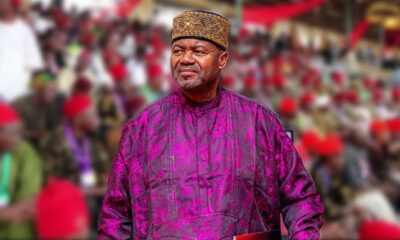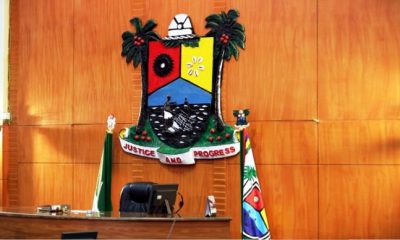News
Ribadu, 100 Others Seek Int’l Anti-Corruption Court
The pioneer chairman of the Economic and Financial Crimes Commission (EFCC), Nuhu Ribadu, and other global anti-graft advocates have called for the creation of an International Anti-Corruption Court (IACC).
The former EFCC chairman was among the over 100 world figures, including former heads of states and governments, former government and intergovernmental officials, and representatives of civil society, governments, business, and faith, who have signed a declaration for the establishment of the IAAC to tackle high-level corruption in governments.
The Integrity Initiative International (III), an international non-governmental organisation fighting “grand corruption”, which pulled the signatories together from over 40 countries, announced the signing of the declaration on its website visited, yesterday.
“We know that grand corruption – the abuse of public office for private gain by a nation’s leaders (kleptocrats) – thrives in many countries and has devastating consequences,” the group stated as part of the reasons for its call for the establishment of the IAAC.
It added that grand corruption continues to flourish despite the existing laws that are in place to check it, noting that the menace thrives not due to insufficient laws.
“The 187 countries that are party to the United Nations Convention Against Corruption (“UNCAC”) each have laws criminalizing corrupt conduct. Yet, kleptocrats enjoy impunity because they control the administration of justice in the countries that they rule,” the group said.
The group, which says it is dedicated to promoting human rights, human health, and international peace and security, noted that kleptocrats corruptly enrich themselves from the trillions of dollars being spent to promote global public health and counter climate change.
“Kleptocrats are robbing their countries of funds needed to meet the 2030 Sustainable Development Goals,” the III said, adding that “Grand Corruption undermines democracy as kleptocrats use their power to suppress the media and civil society, and subvert honest elections.”
It is also of the view that because grand corruption “has global consequences and often cannot be combated by the country’s most immediately victimised by kleptocrats, a new international institution – an International Anti-Corruption Court – is necessary and justified.”
The group said the IAAC should have jurisdiction “to prosecute violations of existing domestic anti-corruption laws, or a new international counterpart of them, by kleptocrats and their collaborators, if the country the kleptocrat rules is unwilling or unable to prosecute a case itself.”
It said the court should also have the authority to prosecute crimes committed by nationals of Member States, and by nationals of other states who commit crimes in the territory of a Member State.
“The IACC should be a court of last resort with the capacity to prosecute and imprison kleptocrats, and thus create opportunities for the democratic process to replace them with honest leaders,” it said.
The group added that the court should have “the authority to recover, repatriate, and repurpose illicit assets for the victims of Grand Corruption” in civil as well as criminal cases.
Some former heads of state and government, who signed the declaration alongside Ribadu, are former prime minister and former foreign minister of Sweden, Carl Bildt; former President of Tunisia, Moncef Marzouki; former President of Bulgaria, Rosen Plevneliev; and former President of Colombia and Nobel Laureate, Juan Manuel Santos.
Others include former prime minister and former chairman of the Presidency of Bosnia and Herzegovina, Haris Silajdžiæ; and former President of Slovenia, Danilo Türk.
Ribadu, the pioneer head of EFCC, Nigeria’s flagship anti-corruption agency, from 2003 to 2007, falls into the category of the signatories who were former government and inter-governmental organisation officials.
He is the only Nigerian on the list of over 100 signatories from 40 countries.
Other countries with representatives among the signatories include Afghanistan, Argentina, Australia, Bolivia, Brazil, Canada, Chile, Colombia, France, Germany, Guatemala, Italy, India, Indonesia, Iran, Jordan, Kenya, and North Macedonia.
Others are, Paraguay, Peru, Philippines, Singapore, South Africa, Spain, Sweden, Switzerland, Tanzania, Ukraine, United Kingdom, United States, Venezuela, Angola, Equatorial Guinea, Malta, Mexico, Philippines, and Republic of the Congo, Russia, and Zimbabwe.
The issue of public sector graft is commonly associated with developing countries where opaque public institutions that often oversee large and lucrative infrastructure or natural resource projects create conducive conditions to pay out bribes.
President Muhammadu Buhari, who has been in office for six years, suggested the creation of a special court to fight corruption in an interview, last Friday.
“Special courts are very important especially in the case of corruption,” the president said in the interview he granted with NTA, aired, last Friday.
Nigeria is among developing countries that perform poorly in the yearly Corruption Perceptions Index (CPI), an index published annually by Berlin-based Transparency International since 1995 which ranks countries by their perceived levels of public sector corruption, as determined by expert assessments and opinion surveys.
Nigeria slumped to 149 (out of 180) on Transparency International’s 2020 CPI, scoring 25 points out of 100.
The ranking placed Nigeria as West Africa’s most corrupt country after Guinea-Bissau.
In 2019, Nigeria was ranked 146th, with a total score of 26 (out of 100).
In 2018 and 2017, the country maintained a CPI score of 27, ranking 144 and 148 respectively.
A total of 180 nations are usually ranked from 0 to 100.
While zero indicates the participating country is ‘highly corrupt,’ 100 signifies the highest level of transparency – ‘very clean.’a
News
NAFDAC Busts Fake Alcohol Factory In Lagos

The National Agency for Food and Drug Administration and Control (NAFDAC) has dismantled a makeshift factory in the Oke Arin market, Lagos Island, where counterfeit alcoholic beverages were being illegally produced.
According to a statement via its X, yesterday, the agency, acting on a complaint, conducted a raid that led to the arrest of three men and the seizure of counterfeit drinks, empty bottles, and packaging materials.
According to NAFDAC, the seized products, which included fake versions of popular alcoholic brands, were valued at over ¦ 180 million.
The main suspect, Mr. Tochukwu Henry, confessed to refilling bottles labelled as Rémy Martin with ST-Rémy contents.
He also admitted to employing two other individuals to assist in the operation.
The statement said, “NAFDAC has raided a makeshift factory in Oke Arin market, Lagos Island, following a complaint about the illegal production of alcoholic beverages. Three men were apprehended and various counterfeit alcoholic drinks, empty bottles, and packaging materials were seized.
“The products, valued at over ¦ 180 million, included fake versions of popular brands. The main suspect, Mr. Tochukwu Henry, confessed to refilling bottles labelled as Rémy Martin with ST-Rémy contents and employing two others to assist in the illicit operation.
“All suspects are currently in custody for further investigation. NAFDAC calls on the public to remain vigilant, especially during the festive season, and to report suspicious activities and products to the nearest NAFDAC office.”
News
Reps Give FG 72 Hours To Unfreeze NSIPA’s Accounts

The House of Representatives has called on the Federal Government to direct the Minister of Finance and Coordinating Minister of the Economy, Wale Edun, to within 72 hours, unfreeze the accounts of the National Social Investment Agency (NSIPA), given its role in addressing hunger and poverty.
The position of the Green Chamber was a sequel to the adoption of a motion at yesterday’s plenary sponsored by the Deputy Speaker, Benjamin Kalu, and 20 other lawmakers.
Allegations of corruption and shady deals compelled the President Bola Tinubu-led government to freeze the accounts of the agency, to give room for a total overhauling of its programmes.
While calling for support for the motion yesterday, Kalu emphasised that NSIPA oversees critical social intervention programmes such as Grant for Vulnerable Groups, N-Power, the Government Enterprise and Empowerment Programme, Conditional Cash Transfers and the National Home-Grown School Feeding Programme, among others.
He also noted that the Renewed Hope Agenda of the Tinubu-led government emphasises the mandate of the NSIPA to cushion the effect of economic shocks on the poor and the vulnerable.
He said, “The House is disturbed that despite the programmes of NSIPA being vital for poverty alleviation, youth empowerment, and economic inclusivity in Nigeria; the agency’s functionality has been hindered due to administrative bottlenecks, insufficient funding and frozen accounts.
“The House is worried that the effort of the government and the laudable programmes of NSIPA were truncated by alleged financial mismanagement by handlers of the programmes leading to the suspension of programmes and freezing of the agency’s account and subsequent investigation by anti-corruption and security agencies.
“The House is concerned that the smooth operations of the programmes and the fulfilment of the mandate of NSIPA are hindered due to the suspension of the accounts of the agency and other administrative bottlenecks, which has remained in force even more than three months after the President reconstituted the new management of NSIPA.”
Kalu who represents Bende Federal Constituency, Abia State, further said the frozen accounts of the agency contradict the President’s mandate on poverty alleviation by hindering and halting social welfare programs, including conditional cash transfers, small business grants, and school feeding initiatives.
This, according to him undermines “Economic empowerment initiatives, delays in achieving Sustainable Development Goals and cause erosion of public confidence and administrative paralysis in fighting poverty, among other things.”
Kalu noted that following the suspension of accounts of the NSIPA, “The N-Power programme has been so negatively affected that 395,731 beneficiaries are owed outstanding stipends to the tune of N81.32bn; a fund already captured under the 2023 and 2024 amended Appropriation Acts, which will lapse by the year ending December 31, 2024.”
Following the adoption of the motion, the House urged the President to mandate the minister of finance and the Coordinating Minister of the Economy to “ensure that all frozen accounts of the National Social Investment Programmes Agency are unfrozen within 72 hours to enable the smooth recommencement of all the programmes.”
The minister was also tasked to ensure the release of funds to NSIPA for the payment of outstanding stipends owed to 395,731 N-Power beneficiaries nationwide without further delay.
It further mandated the Minister of Humanitarian Affairs and Poverty Reduction, Dr Yusuf Sununu, to ensure that all the administrative bottlenecks hindering the smooth operations of all programmes of NSIPA are immediately removed.
News
Rivers Dep Gov Bags Award
Rivers State Deputy Governor, Prof. Ngozi Nma Odu, has expressed gratitude to the Nigerian Institute of Food Science and Technology for upgrading her to the status of a Fellow by the President and Governing Council of the Institute.
Prof Odu expressed this when a delegation of Fellows and other members of the Institute visited her at the Government House in Port Harcourt, yesterday to perform her Investiture as a Fellow of the Institute of Food Science and Technology.
Prof. Odu said that what the Institute has done for her is exceptional, adding that she feels so humbled by their kind gesture and proud of the Institute which she described as a trailblazer.
I want to thank our Emeritus Prof. Simeon Achinewhu for keeping the flag flying and I am pleased to be a part of this family”. Prof. Odu further stressed.
The Deputy Governor who called for continuous prayers for the success of the Governor Fubara-led Administration, noted that prayers were their greatest defense in times of trouble.
“This Administration needs God to sustain us, we need God to direct our steps, we need God to navigate especially when you have challenges, God has done it thus far and I believe the good Lord shall lead us until we finish when he wants us to finish.” The Deputy Governor further stressed.
Also speaking the leader of the delegation, Emeritus Prof. Simeon Achinewhu, said they were in the Government House to decorate the Deputy Governor as a Fellow of the Nigerian Institute of Food Science and Technology, in line with the directive of the national body of the association to formally present the Deputy Governor with her award and certificate of membership, following are indelible contributions to the growth of the association.
Earlier, the Chairman South -East Chapter, of the Nigerian Institute of Food Science and Technology, Dr. Bariwere Samuel, while assuring the State Government of its readiness to partner with the State on its food safety programs, said it is willing to deploy its expertise and resources to compliment the State Government’s efforts in ensuring the availability of safe and nutritious food for its citizens.
-

 Featured13 hours ago
Featured13 hours agoFubara Hails Mbata’s Emergence As President – General Of Ohanaeze Ndigbo
-

 Politics10 hours ago
Politics10 hours agoNASS Queries JAMB Over Spendings At Budget Defense
-
Rivers11 hours ago
LG Boss Presents Cars To Councillors, Transformers To Communities
-
News9 hours ago
Tinubu Appoints Folashade Adekaiyaoja As First DSS Deputy DG
-
Business11 hours ago
NERC Transfers Regulatory Oversight Function To NSERC
-
Nation8 hours ago
Police Arrest Fake Soldiers, Impound 296 Vehicles In FCT
-

 Niger Delta12 hours ago
Niger Delta12 hours agoJulius Berger Reiterates Commitment To Bodo-Bonny Road Project
-

 Politics10 hours ago
Politics10 hours agoLagos Lawmakers List Ex-Speaker’s Many ‘Sins’

